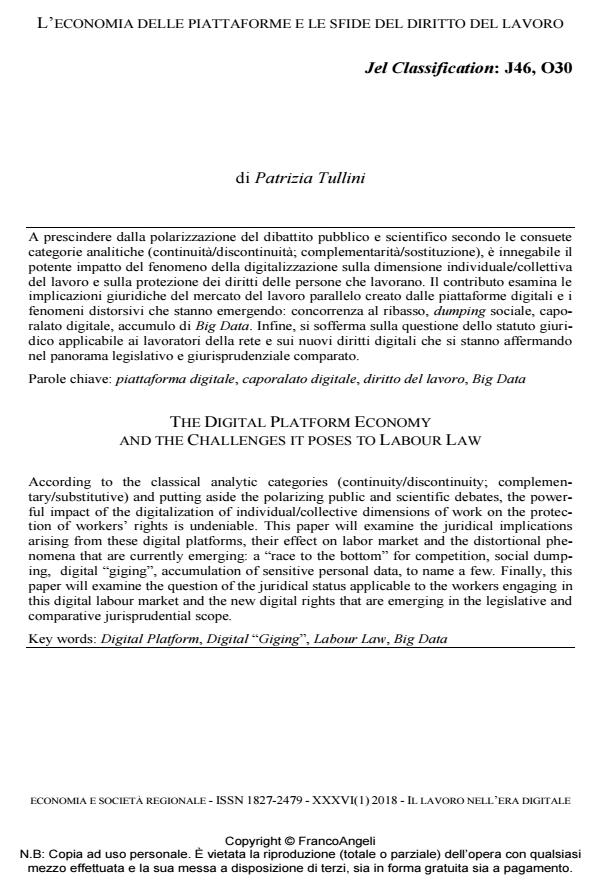L’economia delle piattaforme e le sfide del diritto del lavoro
Titolo Rivista ECONOMIA E SOCIETÀ REGIONALE
Autori/Curatori Patrizia Tullini
Anno di pubblicazione 2018 Fascicolo 2018/1
Lingua Italiano Numero pagine 16 P. 36-51 Dimensione file 258 KB
DOI 10.3280/ES2018-001004
Il DOI è il codice a barre della proprietà intellettuale: per saperne di più
clicca qui
Qui sotto puoi vedere in anteprima la prima pagina di questo articolo.
Se questo articolo ti interessa, lo puoi acquistare (e scaricare in formato pdf) seguendo le facili indicazioni per acquistare il download credit. Acquista Download Credits per scaricare questo Articolo in formato PDF

FrancoAngeli è membro della Publishers International Linking Association, Inc (PILA)associazione indipendente e non profit per facilitare (attraverso i servizi tecnologici implementati da CrossRef.org) l’accesso degli studiosi ai contenuti digitali nelle pubblicazioni professionali e scientifiche
A prescindere dalla polarizzazione del dibattito pubblico e scientifico secondo le consuete categorie analitiche (continuità/discontinuità; complementarità/sostituzione), è innegabile il potente impatto del fenomeno della digitalizzazione sulla dimensione individuale/collettiva del lavoro e sulla protezione dei diritti delle persone che lavorano. Il contributo esamina le implicazioni giuridiche del mercato del lavoro parallelo creato dalle piattaforme digitali e i fenomeni distorsivi che stanno emergendo: concorrenza al ribasso, dumping sociale, caporalato digitale, accumulo di Big Data. Infine, si sofferma sulla questione dello statuto giuridico applicabile ai lavoratori della rete e sui nuovi diritti digitali che si stanno affermando nel panorama legislativo e giurisprudenziale comparato.
Parole chiave:Piattaforma digitale, caporalato digitale, diritto del lavoro, Big Data
Jel codes:J46, O30
- Digitalizzazione, lavoro e contrattazione collettiva Salvo Leonardi, in ECONOMIA E SOCIETÀ REGIONALE 1/2019 pp.46
DOI: 10.3280/ES2019-001005 - Sindacato e lavoratori digitali: organizzazione, rappresentanza, contrattazione Michele Forlivesi, in ECONOMIA E SOCIETÀ REGIONALE 1/2019 pp.31
DOI: 10.3280/ES2019-001004 - La digitalizzazione del lavoro. Questioni aperte e domande di ricerca sulla transizione Giorgio Gosetti, in ECONOMIA E SOCIETÀ REGIONALE 1/2019 pp.91
DOI: 10.3280/ES2019-001008
Patrizia Tullini, L’economia delle piattaforme e le sfide del diritto del lavoro in "ECONOMIA E SOCIETÀ REGIONALE " 1/2018, pp 36-51, DOI: 10.3280/ES2018-001004